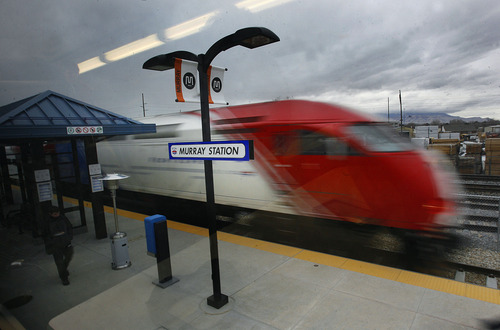This is an archived article that was published on sltrib.com in 2013, and information in the article may be outdated. It is provided only for personal research purposes and may not be reprinted.
The Utah Transit Authority announced Wednesday that it has taken a big step toward cashless bus and train fares with plans to offer reloadable electronic-fare cards.
Under the program to kick off this fall, riders can buy a card for a one-time fee of $3, pay to load and reload amounts between $5 and $500 and then "tap on" and "tap off" electronic readers — now already used by pass holders — as they board and leave to have their fare deducted.
"The biggest benefit we see is the convenience to our riders," Andrea Packer, UTA communications director, told the transit board Wednesday. "If they pay cash, they won't have to have exact change every time they get on the bus. They won't have to spend as much time at ticket vending machines" to buy train or bus rapid-transit tickets.
The new FAREPAY cards will be available at UTA customer-service centers, online (to be mailed to customers), and at what Packer said UTA hopes will be 250 stores initially — and eventually 800. "Rite Aid, Walgreens and Associated Foods stores are some of the ones we are working with right now."
Customers will be able to reload money onto cards online or any store that sells them. The value never expires. Customers may also register online so that if a card is stolen, its value can be frozen and transferred to another card. They may also register the FAREPAY card to automatically reload money — from a connected credit card — anytime its value is reduced to a certain point.
Customers also will be able to check a card's balance online, although readers at stations will not offer that information.
Packer said the cards will allow free transfers within the currently allowed two hours from when they first board a bus or train. UTA is also working to develop ways for cards to recognize some currently allowed discounts for seniors or the disabled. Customers must remember to "tap off" at the end of trips to avoid full length-of-line charges on FrontRunner, and avoid missing available free transfers.
Packer said about 25 percent of UTA riders now pay in cash and could benefit from such cards. About 50 percent of all riders currently use passes — from universities or employers — that already require them to "tap on" and "tap off."
Tapping on and off allows UTA to track trips of all riders, and it uses that data to tweak schedules and routes. The new fare cards will allow it to boost such data collection from more people.
UTA has also been working for the past few years toward a distance-based fare system in which it would charge fares based on length of trips instead of the current flat rate. It has said a major obstacle to that has been creating an electronic fare system for everyone to allow collecting such sliding fares — which would also do away with collecting cash onboard.
"This has been years in the making," UTA General Manager Michael Allegra said of the new cards and capabilities.
No action on UTA police study
The UTA Board was expected Wednesday to approve seeking a consultant to help figure if it could save money by abolishing the UTA Police Department and contracting for policing with another agency. However, the board decided to put off that discussion and vote for at least a month as it continues to review the matter.



